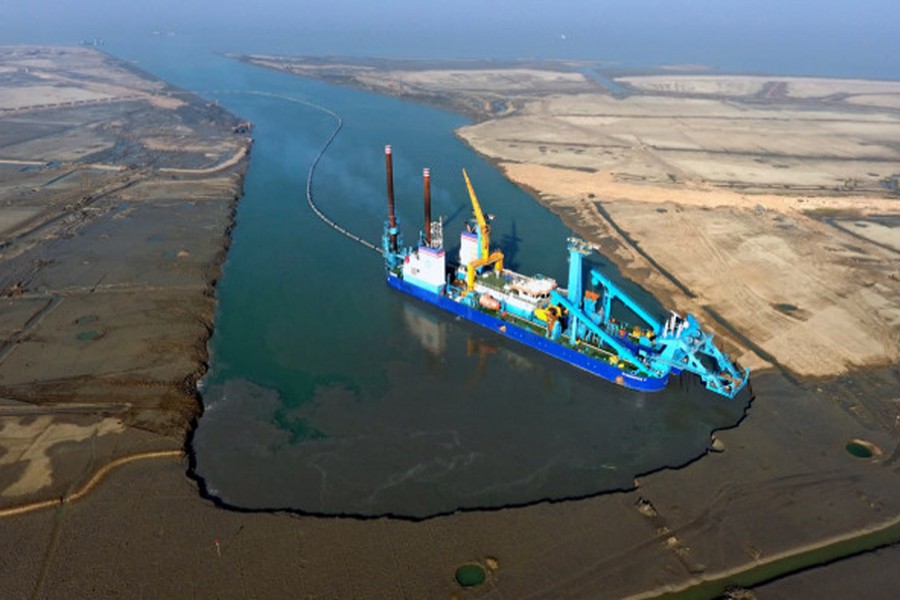
Published :
Updated :

Japan has been developing Bangladesh's first deep-sea port in Matarbari, south of Chittagong which constitutes the "Bay of Bengal Industrial Growth Belt”, said ITO Naoki, Ambassador of Japan to Bangladesh on Monday.
“Bangladesh, located in the Bay of Bengal, is a vital country in geopolitical terms and it needs to utilise its geographical advantage to increase economic opportunities fully,” the Ambassador said while addressing a seminar on ‘Geopolitics of Indo-Pacific and Reconnecting the Bay of Bengal Littorals’.
Bangladesh Institute of International and Strategic Studies (BIISS) and the Embassy of Japan in Bangladesh have jointly organised the seminar as part of the celebration of the 50th anniversary of the establishment of diplomatic relations between Japan and Bangladesh.
“In addition, JICA is implementing several large-scale infrastructure projects under the BIG-B. For example, in December this year, Dhaka Mass Rapid Transit (MRT) Line 6 will start its commercial operation, and Bangladesh Special Economic Zone in Araihazar, the first economic zone developed by Japan, will also be ready for international investment,” Mr Naoki said.
According to the envoy, Japan pursues a ‘Free and Open Indo- Pacific (FOIP)’ that will ensure a rule-based international order to bring peace, stability, and prosperity for every country in the region.
Bangladesh is the country that recognise the importance of rule-based maritime order and shares its value with Japan and other like-minded countries, he added.
The ambassador highly praises Bangladesh's efforts for sheltering the displaced Rohingyas of Myanmar.
He said Japan supports the government's relocation policy of refugees to Bhasan Char and committed to provide US $2 million as the first donor to UNHCR and WFP for their operation in the island.
Muhammad Faruk Khan, Chairman, Parliamentary Standing Committee on Ministry of Foreign Affairs, Bangladesh Parliament, graced the occasion as the chief guest.
He said that the term ‘Indo-Pacific’ received much currency when the Japanese Prime Minister Shinzo Abe described it as the “Confluence of the two seas” in 2007.
Mr. Faruk Khan expressed his expectation that counties such as Japan can play a more active role in ensuring peace and stability in this region as Japan is a forerunner of the concept of ‘Free and Open Indo-Pacific’.
Major General Mohammad Maksudur Rahman, Director General, BIISS, delivered the welcome speech in the seminar chaired by Ambassador Kazi Imtiaz Hossain, Chairman, BIISS.
In his address, Major General Maksud described the importance of the Indo-pacific region as the central determinant of global peace and prosperity in the near future as well as the hub of the 21st century’s economic opportunities.
Ambassador Kazi Imtiaz Hossain, Chairman of BIISS, noted that the discussion in the seminar has led the way for further insights into the geopolitical shifts in the region.
Professor Imtiaz Ahmed, Department of International Relations, University of Dhaka, said that it is the humans who create geopolitics and as long as a region has resources, it will attract attention.
Professor KIKUCHI Tsutomu, Professor of International Political Economy, Aoyama Gakuin University, & Adjunct Senior fellow, Japan Institute of International Affairs (JIIA), said that Japan had been pursuing to implement its FOIP strategy for a rule-based international order.
“Japan is pursuing three pillars to establish rule-based order in this region: strengthening the alliance with the US; moving Southward to construct networks with new alignments (bilateral, trilateral, quadrilateral, and regional) with the countries and institutions in the Indo-Pacific; and constructive engagement with China,” he added.
mirmostafiz@yahoo.com


 For all latest news, follow The Financial Express Google News channel.
For all latest news, follow The Financial Express Google News channel.